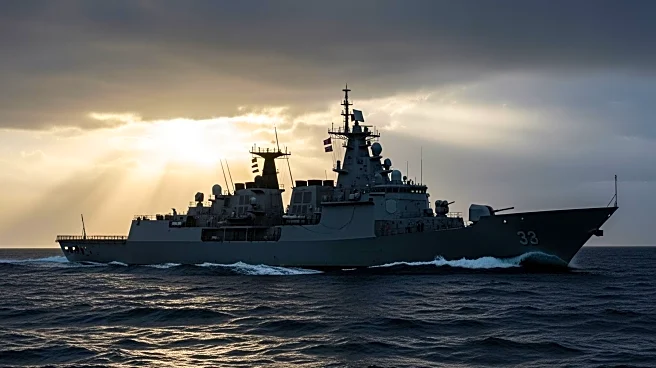What's Happening?
Australia's defense minister, Richard Marles, has expressed concerns over the increasing risks to Australia's sea trade routes due to China's significant military expansion. Speaking at a navy conference
in Sydney, Marles emphasized that open sea lanes, particularly those through the South China Sea and East China Sea, are crucial to Australia's national interests. He described China's military build-up as the largest in the world today, occurring without strategic reassurance, which necessitates a response from Australia and other nations. In response, Australia is enhancing its military capabilities by acquiring frigates from Japan, developing submarine drones with U.S. company Anduril, and expanding its naval shipyards. The conference, attended by navy and coast guard chiefs from various countries, coincides with Australia's plans to build a nuclear-powered submarine fleet in collaboration with the U.S. and Britain under the AUKUS partnership.
Why It's Important?
The situation underscores the strategic tensions in the Indo-Pacific region, particularly concerning the South China Sea, a vital maritime route for global trade. Australia's response to China's military expansion reflects broader regional security concerns and the need for enhanced defense capabilities. The development of a more capable and long-range navy by Australia could alter the balance of power in the region, potentially affecting trade and security dynamics. The involvement of international partners like the U.S. and Britain through the AUKUS partnership highlights the geopolitical significance of the region and the collaborative efforts to counterbalance China's influence. This military build-up and the subsequent responses could have far-reaching implications for international relations and economic stability in the region.
What's Next?
Australia's continued military enhancements and strategic partnerships are likely to provoke further diplomatic engagements and possibly tensions with China. The development of a nuclear-powered submarine fleet under the AUKUS partnership will be closely watched by regional and global powers. Additionally, the ongoing incidents involving Chinese military actions, such as the recent flare incident with an Australian patrol plane, may lead to increased diplomatic dialogues or confrontations. The international community, particularly countries with vested interests in the South China Sea, will be monitoring these developments closely, potentially leading to new alliances or shifts in existing ones.
Beyond the Headlines
The military build-up and strategic responses in the South China Sea region also raise ethical and legal questions regarding sovereignty, freedom of navigation, and international maritime law. The actions taken by China and the responses from countries like Australia could set precedents for how international disputes in contested waters are managed. Furthermore, the presence of protesters at the Sydney conference, including pro-Palestinian groups, indicates the broader social and political dimensions of military and defense policies, reflecting public sentiment and the potential for civil unrest.









